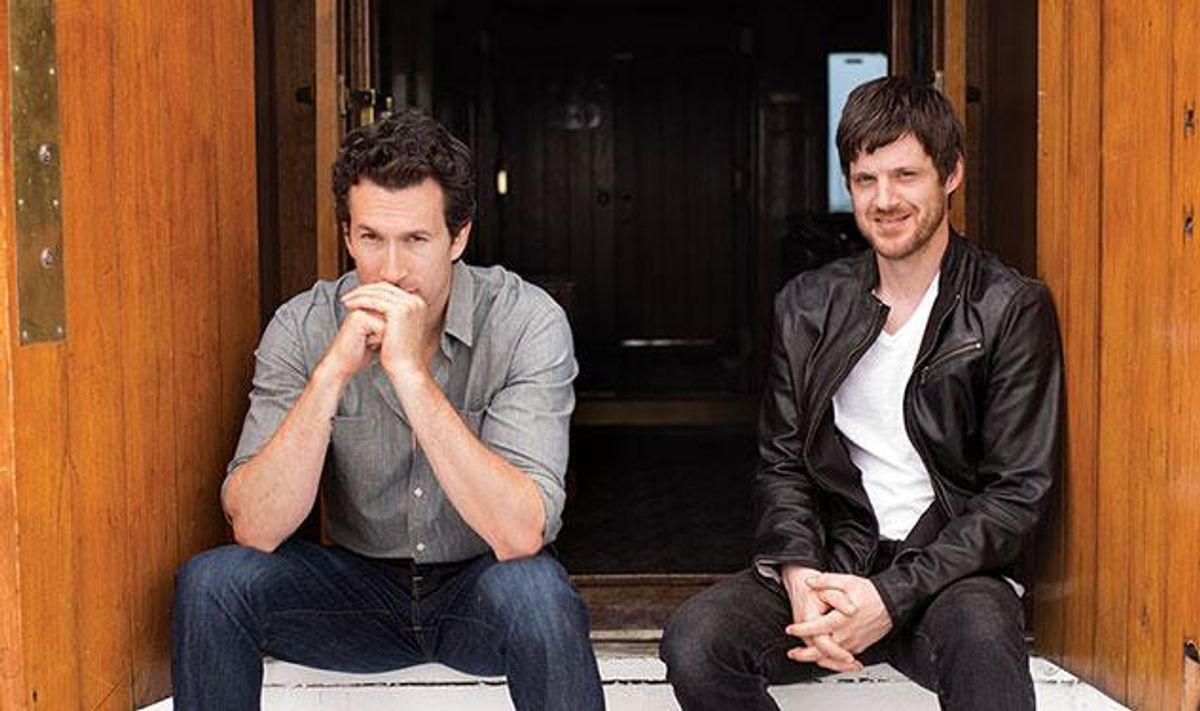
The new Sting production, The Last Ship, is a reflection on the singer’s past and a study of working-class woes.
October 21 2014 11:30 AM EST
February 05 2015 9:27 PM EST
By continuing to use our site, you agree to our Private Policy and Terms of Use.

The new Sting production, The Last Ship, is a reflection on the singer’s past and a study of working-class woes.
The Last Ship stars Aaron Lazar (left) and Michael Esper | Photography by Tim Klein | Shot on location at the Columbia Yacht Club, Chicago.
There's nothing campier than the collapse of a British industrial town. Or at least that's what a handful of recent Broadway shows would have us believe. In the past decade, we've seen musicals about unemployed blokes who are saved from despair by drag queens (Kinky Boots) and male stripping (The Full Monty), and even Billy Elliot took a break from the hero's tender ballet dreams to stage a zany puppet show about Margaret Thatcher. It all makes losing your job seem kind of
fabulous.
But Sting might disagree. This fall the singer pays tribute to his own working-class roots with The Last Ship, a Broadway production inspired by the demise of the shipbuilding trade in his hometown of Wallsend near Newcastle. Though it's filled with feeling (and plenty of comic relief), the show won't be shooting glitter -- literally or metaphorically -- over its audience.
"It's emotional as opposed to sentimental, and that involves watching people struggle through hardship," says director Joe Mantello, the gay director of Broadway hits such as Wicked and Other Desert Cities. "There's not a contest where people come in and strip at the end, and there's not a transvestite that's going to come in and add glamour. This is a different kind of musical."
That's clear from Sting's score, which favors lush ballads, stirring folk tunes, and complex story-songs. The music is meant to evoke a community's heart, without the razzle-dazzle. "The tone matters because it's important that you take these people seriously," says John Logan, the gay scribe who cowrote The Last Ship as well as the screenplays for films including Hugo and Gladiator. "Shipbuilding wasn't just a job. It was a legacy. It was a way of life. It was a community event. We have to honor that."
Actor Aaron Lazar agrees. "If real Geordies come to this play and don't believe that we're Geordies, then we've got a problem," he says, referring to the nickname for inhabitants of the Tyneside region of North East England, where Sting grew up. "There's a level of authenticity I love to find because I think the audience deserves it." In one scene, for instance, Lazar's character, Arthur, who works for the company that might take over the shipyard, tells his girlfriend Meg (Rachel Tucker) exactly what he envisions for their future. During Ship's first run in Chicago this summer, that moment was carefully revised. "Even a few days before opening, we were working on our body language to be more specific to two people who have been together for seven or eight years," Lazar says, adding that choreographer and movement director Steven Hoggett was crucial to the process. "We were really able to make these relationships as specific as they would be in a play, which is unique for a musical."
For Mantello, who can be seen in HBO's film version of The Normal Heart, that's the only way to work. "I don't approach the show any differently than I would a play," he says. "I'm always surprised in musicals that the acting can be so flat and presentational. I'm not saying it has to be Actors Studio doing Thoroughly Modern Millie, but I do think there's a way to find a kind of truth."
Still, the performers have to draw a line between honoring Sting's past and sounding just like Sting. This is especially the case for Michael Esper, Ship's male lead, who finds himself in a love triangle with Lazar's and Tucker's characters. His Gideon is a rebel who left town for 15 years and is now back to face his family legacy, which gives Esper the most obvious connection to the musician's own life. "If I were to try to imitate Sting, I'd be a poor substitute," he says. "But his style and the content of the show are deeply interconnected. I can learn a lot about what he's communicating by how he's communicating. You've got this driving, rhythmic phrasing with this languid style, and that creates a lot of tension."
There's a similar tension in the storytelling, which isn't always realistic. Yes, the Geordies need to have the proper accent, but they also need to exist in a world where poetic lyrics and romantic plot twists feel natural. The show might not be campy, but it's still a musical. "It's poetic," Mantello says, noting that The Last Ship floats in a "heightened realm" where everyday people can move and speak in a beautiful way. "There's a marriage of this gritty, industrial, very earthbound world and this romantic, dreamy, impressionistic world," adds Esper. "When the hauntings are happening, when the past comes up, you have to give in to those moments and try to make them as real as a scene in a pub. But it feels very true somehow, you know?"
The Last Ship begins previews Sept. 29 on Broadway in New York City for an official opening on October 26.
Want more breaking equality news & trending entertainment stories?
Check out our NEW 24/7 streaming service: the Advocate Channel!
Download the Advocate Channel App for your mobile phone and your favorite streaming device!